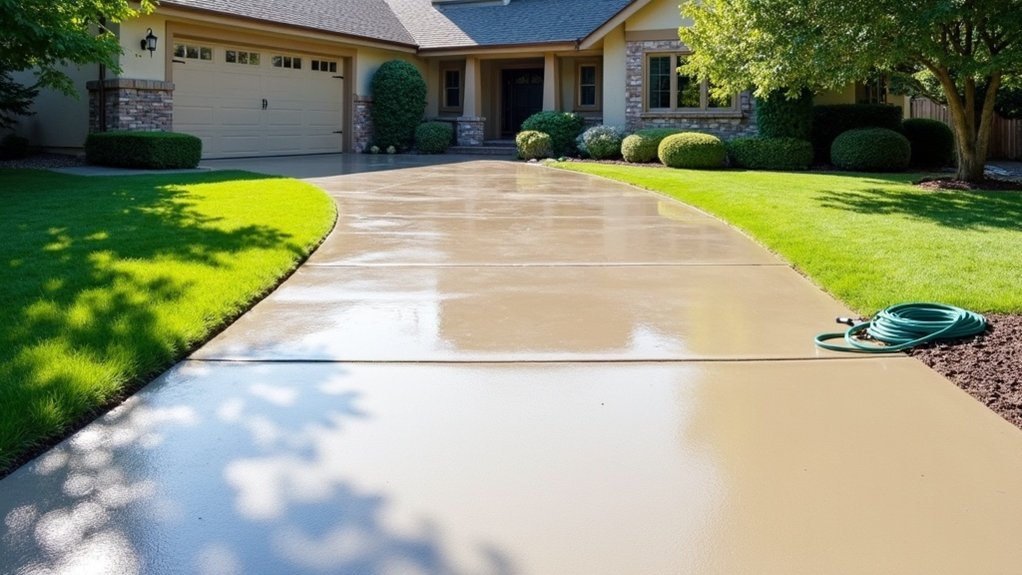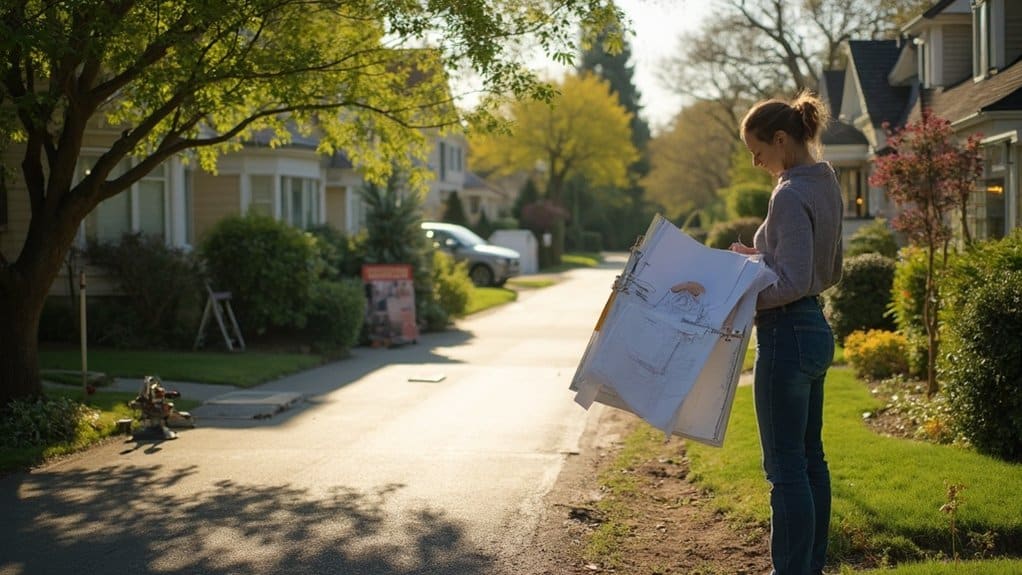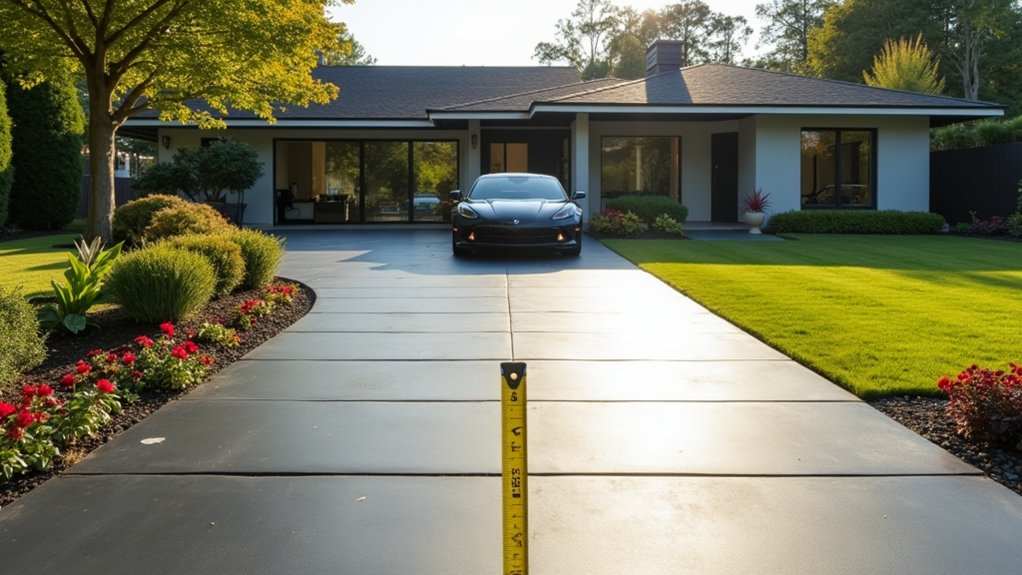Yes, if you’re planning to install a concrete driveway in the UK, you will likely need a permit, particularly if it covers more than 40 square metres or connects to a public road. Local councils have specific regulations regarding setbacks and width to ensure safety and compliance. Not obtaining a permit could result in fines or the removal of your driveway. To navigate the permitting process effectively, it’s crucial to understand these requirements.
Table of Contents
ToggleKey Takeaways
- A permit is usually needed for new concrete driveways that are larger than 40 square metres.
- If your driveway connects to a public road, a permit is often required to comply with local regulations.
- Local councils enforce setback and width restrictions, which may also require you to obtain a permit.
- Failing to secure a permit can lead to fines, legal issues, or the need to alter or remove the driveway.
- It’s best to consult with local authorities or contractors to understand the specific permit requirements for your driveway project.
Understanding Permit Requirements for Concrete Driveways
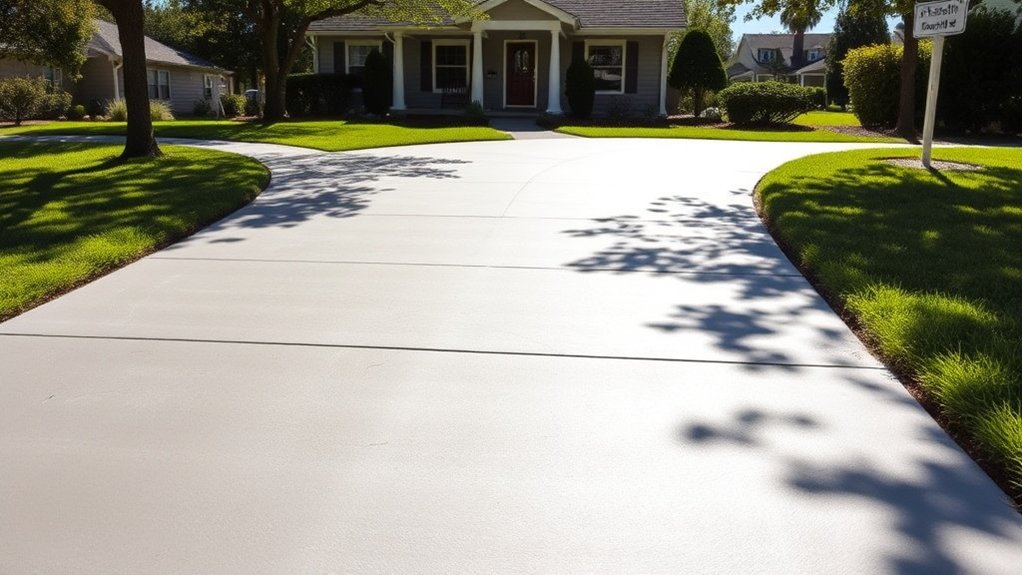
When planning to install or significantly modify a concrete driveway, it’s essential to understand the permit requirements to ensure compliance with local regulations.
Most local councils in the UK require permits for new driveways or major alterations, especially if the area exceeds a certain size, typically around 40 square metres. Additionally, a driveway permit is typically required for new driveway connections accessing public roads, which further emphasizes the importance of checking local regulations.
It’s also important to adhere to guidelines regarding setbacks from property boundaries and local width restrictions, which are usually around 2.4 metres.
If your project impacts drainage or landscaping, you may need to consider environmental factors and submit detailed site plans.
Not securing the necessary permits can result in fines or the requirement to remove the driveway, so always verify local regulations before starting your project.
The Application Process: What You Need to Know

When applying for a concrete driveway permit, you’ll need to collect key documents like site plans and contractor licensing details. Most concrete projects require a permit in New Jersey, so be sure to check your local regulations. After submitting your application and fee, local authorities will review your plans to ensure they meet zoning and building regulations. Remember, you can’t start work until you’ve received formal approval and completed all necessary inspections. For instance, if you’re planning a new driveway, having all your paperwork in order can save you time and hassle later on.
Required Documentation Overview
To successfully apply for a driveway permit, you’ll need to gather several essential documents to ensure compliance with local regulations.
Here’s a checklist to make sure you have everything required:
- A completed driveway permit application form, along with the applicable fee.
- A detailed site plan illustrating the location and dimensions of the driveway.
- Proof of compliance with zoning regulations and environmental considerations.
- Detailed design specifications, including materials and driveway slope.
Remember that different types of permits may apply depending on the scope of your project, so it’s wise to check your local requirements. Additionally, obtaining a Right of Way Permit is crucial if your driveway work affects city roads or easements.
Having these documents prepared will help streamline your application process and improve your chances of approval.
Approval and Inspection Process
Once you’ve gathered all the necessary documentation for your driveway permit application, you’ll proceed to the approval and inspection process.
Start by submitting your application, which should include a scaled site plan and the required fee, through your local council’s online portal. The plan review will check for compliance with local regulations, zoning, and safety requirements, which can take anywhere from 2 days to 8 weeks.
During this period, officials will evaluate your project against set inspection criteria. You’ll also need to attend a pre-construction meeting to discuss compliance checks before commencing work.
Throughout the construction phase, ensure your property address is clearly visible to aid inspections, and be ready for a final inspection to confirm that all work adheres to approved plans and local regulations.
Documentation Required for Permit Applications

To obtain a driveway permit, you’ll need to gather several essential documents to demonstrate compliance with local regulations.
The key documentation required includes:
- Site Plan: A detailed drawing illustrating the proposed driveway’s location, dimensions, and layout.
- Proof of Ownership: If you have owned the property for less than a year, provide a copy of the deed to confirm your authority to make changes.
- Parcel Identification: Include the parcel ID number or legal description to verify ownership and location.
- Drainage and Environmental Approvals: If your property is situated in wetlands or drainage zones, you’ll need relevant documentation from the appropriate agencies.
Collecting these documents early will help ensure a smoother application process and minimise potential delays in obtaining your driveway permit.
Consequences of Not Obtaining Permits
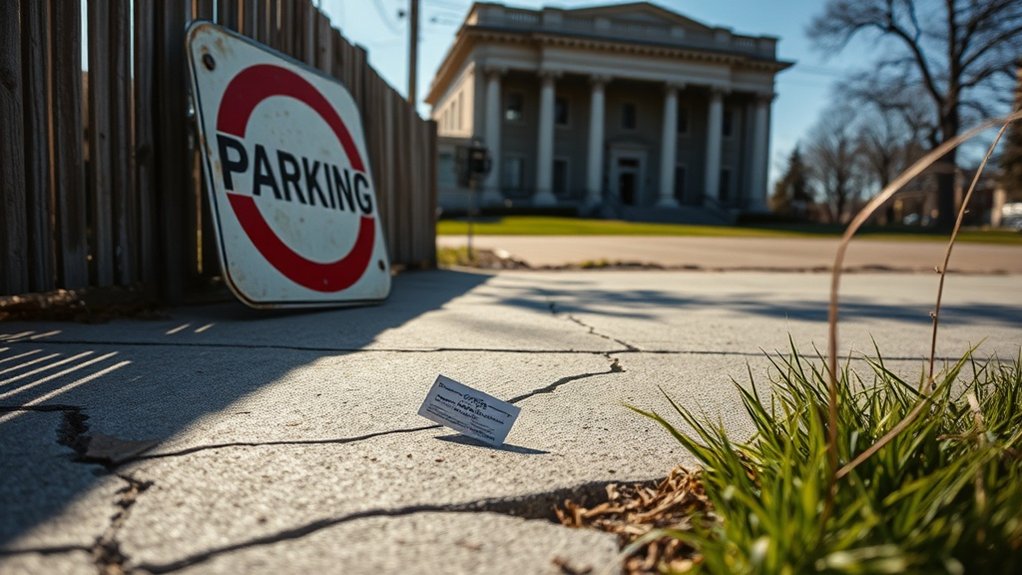
Failing to obtain a permit for your concrete driveway can result in hefty fines from local councils, which may accumulate on a daily basis.
You could also incur additional costs if you’re instructed to alter or remove the driveway to meet building regulations.
Moreover, not having the proper permits can jeopardise your insurance coverage, leaving you open to liability claims and potential denial of damage claims due to non-compliance.
It’s not worth the risk.
Legal Penalties and Fines
Failing to obtain the necessary permits for your concrete driveway can result in serious legal penalties and fines, which can vary significantly depending on your local council.
The implications of ignoring this requirement can escalate quickly.
- Fines may begin at a few hundred pounds and can increase daily.
- Some councils may impose penalties that are several times the original permit fee.
- Authorities can issue stop-work orders, halting all construction until you comply.
- Ignoring these orders can lead to higher fines and further delays to your project.
In the end, the financial and legal consequences of carrying out unpermitted work can far exceed the cost of simply securing the required permits.
Always ensure you comply to avoid these costly issues.
Increased Construction Costs
Neglecting permit requirements for your concrete driveway can significantly raise construction costs.
Without the right permits, you risk having to redo work to comply with local building regulations, which can be expensive. Contractors often charge more for projects without permits due to the extra risks and administrative tasks involved.
Additionally, delays caused by permit issues can prolong your project, increasing labour and equipment rental costs. If your driveway lacks necessary features, such as expansion joints, you could face unexpected expenses for retrofitting.
Careful budget planning is crucial; unforeseen modifications and compliance problems can lead to costs that far exceed your original budget, so it’s vital to secure permits in advance.
Insurance Coverage Issues
When you build a driveway without the necessary permits, you risk serious insurance coverage issues that can threaten your financial security.
Not obtaining permits can lead to several liabilities, such as:
- Your home insurance policy could be voided for damages related to unpermitted work.
- Claims for structural failures or accidents linked to the driveway might be denied.
- You face increased risks of lawsuits from injuries or damages.
- Proving compliance can become complicated, weakening your legal defences.
Insurance companies expect you to follow local building regulations, and without the right permits, you could face both financial and legal consequences.
Ultimately, not having permits can’t only impact your coverage but also reduce your property’s value and insurability in the long run.
The Role of Contractors in the Permitting Process
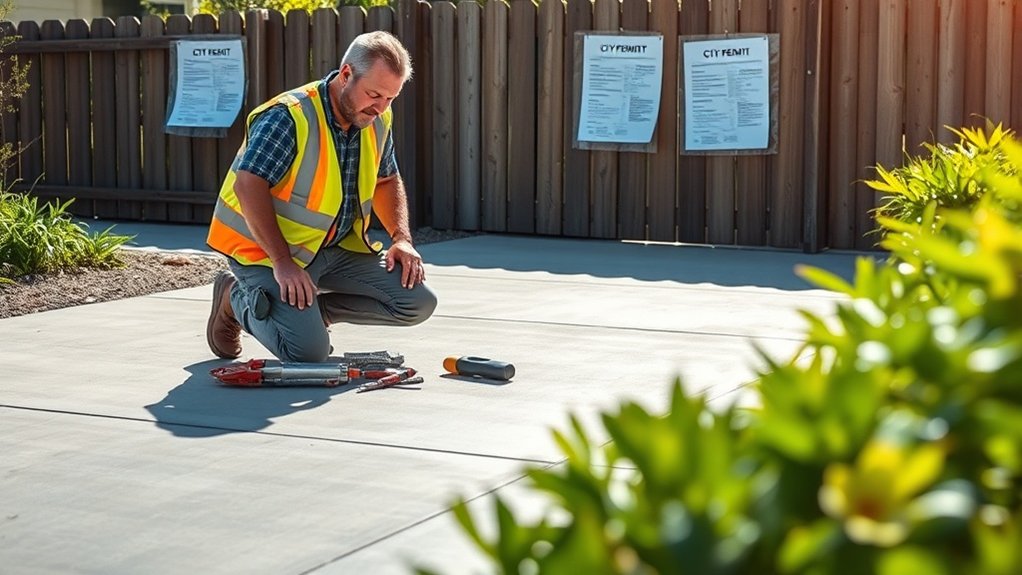
Navigating the permitting process can be tricky, but contractors are vital for ensuring compliance and efficiency in your concrete driveway project.
Their expertise allows them to manage permit applications, taking the hassle of paperwork off your hands. They include permit fees in their initial estimates, ensuring you know the costs upfront.
Licensed contractors work closely with local building authorities to secure the necessary approvals before work starts. They also schedule inspections to ensure all safety codes and regulations are met.
Their familiarity with local requirements helps create designs that comply with regulations, and their connections with government agencies can ease the process for modifications, such as curb cuts.
Local Regulations That Impact Driveway Projects
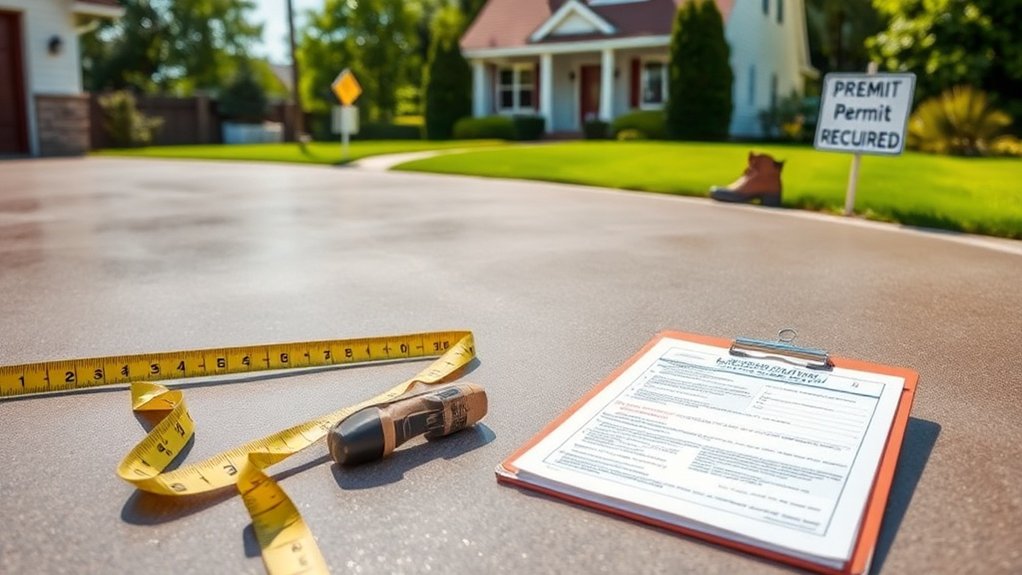
Understanding local regulations is crucial for the successful completion of your concrete driveway project, as these laws govern various aspects from design to construction.
Local planning laws can differ significantly, affecting your driveway’s dimensions and overall layout. Here are some key points to consider:
- Planning permissions may be necessary for driveway dimensions that don’t conform to local standards.
- Setback requirements specify the minimum distance your driveway must be from property boundaries.
- Easements and utility rights-of-way may restrict where you can position your driveway.
- Regulations often outline minimum width and maximum length standards for safety purposes.
Additionally, driveways over five square metres must use permeable materials to comply with local regulations.
Always check with your local council before starting your project to ensure compliance with these regulations.
Steps to Obtain a Driveway Permit

To obtain a driveway permit, follow these straightforward steps to ensure compliance with local regulations.
Firstly, complete and sign the driveway permit application form provided by your local council. Attach a detailed site plan that clearly indicates the proposed location of the driveway and any existing structures.
You’ll need to submit several copies of this plan along with any necessary supporting documents, such as zoning permits. Don’t forget to pay the application fee.
After submission, your local planning department will review your plans to ensure they align with construction and environmental standards.
Be prepared for inspections during the construction phase to confirm that the work adheres to the approved designs and materials.
Once all requirements are fulfilled, you’ll receive your final approval to proceed with the driveway installation.
Importance of Compliance With Local Codes and Standards
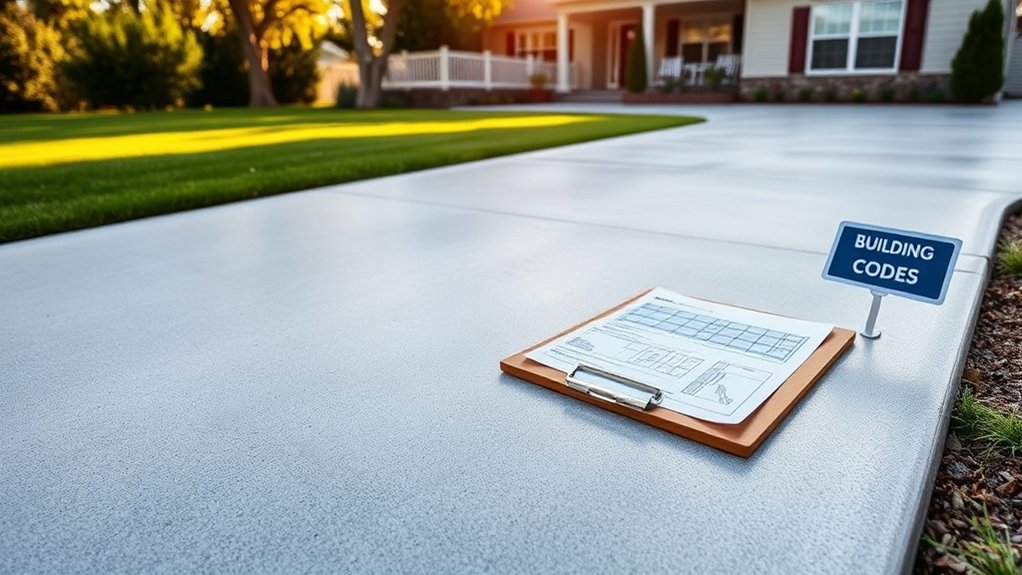
Complying with local codes and standards is crucial not only for legal reasons but also for ensuring the safety and durability of your driveway.
Following these regulations offers several benefits that contribute to community safety:
- Ensures that materials and construction methods meet safety standards, reducing hazards.
- Supports organised development by following zoning laws and property boundaries.
- Safeguards public infrastructure from issues like inadequate drainage.
- Addresses environmental concerns by managing water runoff and preventing erosion.
Frequently Asked Questions
How Can I Find My Local Building Authority’s Contact Information?
To find your local building authority’s contact information, visit your local council’s website for details on regulations and permit requirements. Alternatively, you can pop into your local council office or call the non-emergency number for assistance.
What Is the Average Cost of a Driveway Permit?
The average cost of a driveway permit in the UK typically ranges from £50 to £500, depending on the size and location of the project. When applying for a permit, be mindful of potential extra charges for inspections, dropped kerbs, and environmental assessments that may come up.
Can I Apply for a Permit Online?
Yes, you can apply for a permit online. Many local councils in the UK have found that submitting applications online can speed up the process by around 30%. This makes it a convenient choice for both homeowners and builders.
Are There Exceptions for DIY Driveway Projects?
Yes, there are exceptions for DIY driveway projects in the UK. Generally, smaller driveways or basic flatwork within your property might not need planning permission, but it’s essential to check with your local council first to ensure you’re following the rules. For example, if you’re laying a small gravel driveway, it may be straightforward, but always confirm to avoid any issues.
What Happens if I Move During the Permitting Process?
If you move during the permitting process, you’ll need to manage the permit transfer process with care. Make sure to inform the relevant authorities about your change of address and ensure that you comply with all requirements. This can help you avoid fines or delays in completing your project. For instance, if you’re building an extension, it’s crucial to keep the local council updated to prevent any issues.
Conclusion
In summary, obtaining a permit for your concrete driveway is crucial for complying with local regulations and avoiding fines. Some homeowners might think smaller projects can skip this step, but local codes often have specific requirements that can impact your property’s value and safety. By following the correct application process and working with experienced contractors, you can protect your investment and meet community standards.
Know the essential steps to secure planning permission for your tarmac driveway—discover key insights that could save you time and Read more
Learn about driveway width regulations and discover the essential requirements that could affect your property—find out how wide your driveway Read more
Learn about the lifespan and durability of concrete driveways, and discover essential tips to ensure yours lasts for decades to Read more

